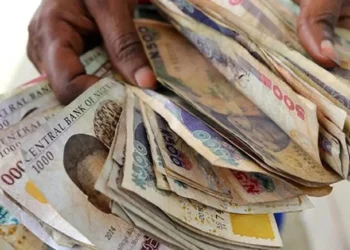Nigeria’s digital payment landscape experienced an extraordinary surge in 2024, with total electronic transactions hitting an all-time high of N1.07 quadrillion. This marks the first time the country’s e-payment sector has crossed the quadrillion mark, reflecting a 79.6% increase from the N600 trillion recorded in 2023.
In U.S. dollar terms, the total transaction value stands at approximately $702.6 billion, based on the closing exchange rate of N1,535/$1 as of December 31, 2024.
December Sees Record-High Transactions
Throughout 2024, Nigeria witnessed a steady rise in electronic payments, with December emerging as the peak month. Driven by increased consumer spending during the festive season, Nigerians conducted e-payments worth N115.1 trillion in December alone, setting a new monthly record on the Nigeria Inter-Bank Settlement System (NIBSS) Instant Payment (NIP) platform.
Transaction Volume Also on the Rise
Beyond the monetary value of transactions, the volume of e-payment transactions also experienced significant growth. The total number of processed transactions rose from 9.7 billion in 2023 to 11.2 billion in 2024, representing a 15.5% year-on-year increase.
Financial analysts attribute this rapid adoption of electronic payments to several factors, including the Central Bank of Nigeria’s (CBN) cashless policy, limitations on daily cash withdrawals, and the scarcity of physical cash in the banking system.
Impact of Cash Scarcity and CBN’s Cashless Policy
Since the implementation of the revised cashless policy in January 2023, individual cash withdrawals have been capped at N500,000 per week, while corporate withdrawals are limited to N5 million per week. This policy, coupled with reduced cash availability at banks, has pushed more Nigerians toward digital transactions.
A Lagos-based financial analyst, Mr. Adewale Adeoye, noted that many Nigerians now rely more on electronic payments due to the difficulty of accessing cash from banks. “It is becoming increasingly difficult to withdraw large sums from banks. Even when you visit a branch, you might be told that you cannot withdraw more than N5,000 over the counter,” he explained.
This situation has forced many individuals and businesses to turn to Point of Sale (PoS) operators, mobile transfers, and other digital payment methods for transactions.
Understanding NIBSS Instant Payment (NIP)
The NIBSS Instant Payment (NIP) system has played a crucial role in facilitating seamless financial transactions across Nigeria. Launched in 2011, NIP is an account-based, real-time inter-bank payment system that ensures instant value transfers between users.
Nigerian banks have integrated NIP into their various digital banking channels, including:
- Internet banking
- Bank branches and kiosks
- Mobile banking apps
- Unstructured Supplementary Service Data (USSD) platforms
- PoS machines and ATMs
With the continued push for digital financial inclusion, more Nigerians are adapting to mobile money transfers, PoS payments, and USSD banking, reducing dependence on physical cash.
What Lies Ahead?
As Nigeria continues its transition toward a cashless economy, e-payment transactions are expected to grow even further in the coming years. The rise in fintech innovations, increased smartphone penetration, and improved banking infrastructure are set to drive the adoption of seamless, digital financial solutions.
Industry experts predict that unless cash withdrawal policies change drastically, electronic transactions will remain the dominant form of payment for individuals and businesses alike.
Bottom Line
The record-breaking N1.07 quadrillion in e-payment transactions signifies a fundamental shift in Nigeria’s financial ecosystem. With digital payments becoming the norm, the country is moving towards a future where financial transactions are faster, more efficient, and increasingly cashless.









